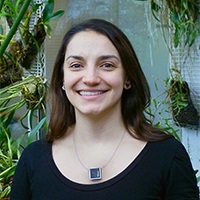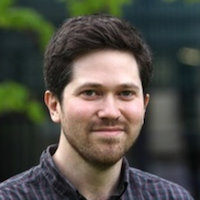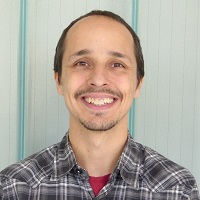Les séminaires de biologie quantitative et computationnelle réunissent les chercheurs en biologie, médecine, pharmacie, informatique, mathématiques et statistique dans le but de favoriser les échanges et d'établir des collaborations. Ils sont organisés par le groupe de biologie computationnelle au Département de mathématiques et de statistique à l'Université de Montréal, le CAMBAM, et le CRM.
The Seminar Series on Quantitative and Computational Biology serves to bring together researchers in Biology, Medicine, Pharmacy, Informatics, Mathematics, and Statistics to share new results and establish collaborations, and is an initiative of the Computational Biology group at the Department of Mathematics and Statistics at the University of Montreal, CAMBAM, and the CRM.
Pour être ajouté à notre liste d'envoi, SVP envoyez-nous un courriel.
To be added to our mailing list, please send us an email.
HORAIRE/SCHEDULE
Understanding variation in malaria infection dynamics
Nicole Mideo
Infection outcomes are highly variable: some individuals suffer severe illness while others seem relatively unharmed by the same infection. Underlying this variation are numerous sources of heterogeneity, including parasite genetics, host genetics, and infectious dose, among others. Yet mechanistic explanations of differential infection outcomes remain elusive. Focusing on data from experimental malaria infections in lab mice, my research has been developing and refining mathematical models to reveal those mechanistic explanations. In this talk, I will describe what we have learned about the parasite traits, host traits, and their interactions that give rise to the observed variation in malaria infection dynamics and outcomes for hosts.
Watch the talk on Youtube.
Using population cohorts to study early cancer evolution and developing new detection tools
Philip Awadalla
In this presentation we will describe a number of different oncology programs focusing on how population cohorts, rather than clinical cohorts, enable studies of early detection and evolution of cancer. Early cancer detection is critical to improving health outcomes and cancer survival. Our team leads a number of programs that have generated genomic and machine learning technologies and resources that can be adapted to improve early cancer genomic studies and biomarker development for both blood, as well as solid tissue tumors. Recent studies have linked age-related mutation accumulation in blood to a number of diseases. There is a clear need to understand the biology and develop biomarkers and tools that distinguish benign accumulation from cancer. Recent evidence from our team and others shows that in a subset of individuals, age related clonal hematopoiesis (ARCH) leads to the generation of pre-leukemic hematopoietic stem cells (HSCs) and eventual leukemia development using population cohorts. Finally, we show how utilizing cell-free DNA as a screening tool for early cancer detection requires profiling of blood plasma samples collected from asymptomatic individuals prior to the diagnosis of cancers to enable assessment of the earliest detectability and predictive performance of potential biomarkers. We demonstrate that cfDNA methylation markers are indicative of breast cancers are detectable up to 7 years prior to a stage I diagnosis.
Durability of immunological memory after viral infection and vaccination
Veronika Zarnitsyna
Immunological memory, generated in response to infection or vaccination, may provide complete or partial protection from antigenically similar infections for the lifetime. The longevity of immune response is mainly defined by two arms of adaptive immunity - humoral immunity and cell-mediated immunity. We will review the current state of the field and look at responses to two viral infections in more detail. Using a statistically powerful mixed-effects differential equations framework, we analyzed longitudinal CD8 T cell responses after the live-attenuated yellow fever vaccine (YFV) and immune responses after SARS-CoV-2 infection and Covid-19 vaccines. Using only the first year of data, our models accurately predicted YFV-specific CD8 T cell frequencies up to 30 years post-vaccination. Our results show that the power law decay model is more consistent with the decay of both virus-specific CD8 T cells and antibodies to most viral epitopes compared to commonly used exponential and bi-exponential decay models, a finding that may be useful for vaccine evaluation and epidemiological modeling. Moreover, since power laws asymptotically decline more slowly than any exponential decline, our results help explain the longevity of immune memory phenomenologically.
Force generation by protein-DNA co-condensation
Thomas Quail
Interactions between liquids and surfaces generate forces that are crucial for many processes in biology, physics and engineering, including the motion of insects on the surface of water, modulation of the material properties of spider silk and self-assembly of microstructures. Recent studies have shown that cells assemble biomolecular condensates via phase separation. In the nucleus, these condensates are thought to drive transcription, heterochromatin formation, nucleolus assembly and DNA repair. In this talk I will show that the interaction between liquid-like condensates and DNA generates forces that play a role in bringing distant regulatory elements of DNA together, a key step in transcriptional regulation. To do this, we combined quantitative microscopy, in vitro reconstitution, optical tweezers and theory to show that the transcription factor FoxA1 mediates the condensation of a protein-DNA phase via a mesoscopic first-order phase transition. After nucleation, co-condensation forces drive growth of this phase by pulling non-condensed DNA. Altering the tension on the DNA strand enlarges or dissolves the condensates, revealing their mechanosensitive nature. These findings show that DNA condensation mediated by transcription factors could bring distant regions of DNA into close proximity, suggesting that this physical mechanism is a possible general regulatory principle for chromatin organization that may be relevant in vivo.
Picking apart early human history with genomic data
Simon Gravel
While a modern human origin within Africa is now broadly accepted, considerable uncertainty surrounds specific models of divergence and migration across the continent. Did we mostly descend from a single ancestral African population, or did archaic hominins in Africa contribute appreciably to our gene pool? Or are these two commonly contrasted models missing a simpler alternative? I will present our best efforts at reconstructing what might have occurred in human demography between one million years ago and the present.
Understanding how the transmission network structure affects the spread of SARS-CoV-2
Anjalika Nande
It is known that the transmission network over which a disease spreads has a significant impact on the epidemic dynamics. In this talk, we will examine how the structure of the transmission network affects the spread of SARS-CoV-2, and impacts the efficacy of control measures in three different contexts. First, we develop a stochastic epidemic model to study the effects of COVID-19 clinical progression and the transmission network structure on the efficacy of social distancing measures. We find that the strength of within-household transmission is an important determinant of success. Coupled with residual external transmission it governs the size of the epidemic, individual risks of infections and can lead to long delays before the effects of an intervention become apparent. Next, we extend this model to quantify the effect of evictions, and policies preventing them, on SARS-CoV-2 epidemics in cities. We show that evictions always lead to higher levels of infections and that they reduce the effectiveness of social distancing measures. Our results are in favor of policies that stem evictions as a means to control epidemics like COVID-19. Finally, we show that a hierarchical metapopulation model of COVID-19 spread at multiple spatial or demographic scales can explain the counter-intuitive observed relationship between crowding and the temporal dynamics of epidemics in cities.
Sticking around and calling for help: lymphocyte strategies for augmenting tissue immunity
Joshua Moreau
My work focuses on understanding how local interactions regulate the immune function of tissue resident lymphocytes. I will discuss my recent work applying single cell RNA sequencing, in vivo mouse models, and translational approaches to dissect how adhesion and integrin molecules guide T cell function within skin cancer and tissue repair.
Personalized persuasive technologies for health
Alaa Alslaity
Persuasive technologies for health are designed to promote desired health behaviour using various persuasive strategies. Recent years have witnessed an increasing number of persuasive interventions implemented in various health domains, including mental health, physical activity, and healthy eating. Most of these interventions adopt a one-size-fits-all design approach. However, research has shown that a persuasive strategy that works for one individual may actually demotivate others, suggesting that persuasive interventions should be personalized and adaptive to users and context. Our research shows that users' responsiveness to persuasive strategies can be affected by their characteristics (e.g., personality traits, age, gender, etc.) and contextual factors (e.g., time, weather, location, etc.). In response to these findings, we investigate approaches to personalize persuasive health interventions by understanding users and contextual factors that might affect the efficacy of different persuasive interventions.
CONFÉRENCIERS/
SPEAKERS

NICOLE MIDEO University of Toronto

PHILIP AWADALLA Ontario Institute of Cancer Research

VERONIKA ZARNITSYNA Emory University

Thomas Quail Max Planck Institute of Molecular Cell Biology and Genetics

SIMON GRAVEL McGill University

ANJALIKA NANDE Harvard University

JOSHUA MOREAU University of California, San Francisco
